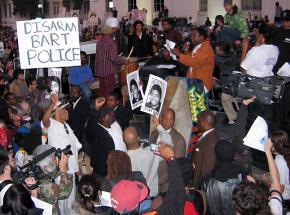BART’s do-nothing response to police murder
explains why the BART police need a truly independent civilian review board if outrages like the murder of Oscar Grant are going to stop.
OAKLAND, Calif.--Eight months after the deadly shooting of Oscar Grant III by a Bay Area Rapid Transit (BART) police officer, family members and supporters are still waiting for the creation of an independent civilian review board to investigate BART police wrongdoing.
BART officer Johannes Mehserle, who shot the unarmed African American 22-year-old as he lay facedown on the concrete train station platform, now faces murder charges, after a judge ruled in a preliminary trial in June that the officer would stand trial for murder.
But Grant wasn't just murdered by a loose cannon. His death implicates an entire police agency that continues to operate without any measure of external accountability or oversight.
On July 30, after months of committee meetings, BART finally released a draft proposal for handling civilian complaints about police--a proposal that falls far short of the substantial oversight that the victims of police brutality deserve.
BART's proposal calls for an 11-member citizen panel that is appointed by the system's board of directors and "authorized" to merely recommend discipline. In other words, BART's proposal creates a committee with no more power or authority than any regular passenger on the system.

The BART proposal would also allow the police associations to appoint their own representative to the board.
The civilian review board must come up with a two-thirds super-majority in order to appeal a decision by the BART general manager to the board of directors. In turn, board of directors' decisions regarding discipline need a two-thirds vote.
"In other words, it takes a two-thirds vote of BOTH the review board AND the entire BART board to impose discipline on a cop," pointed out San Francisco Bay Guardian's Tim Redmond. "That's an almost impossible standard."
State Assembly member Tom Ammiano calls it "a watered-down shell of civilian oversight." He's proposing an alternative model based on San Francisco's Office of Citizens Complaints, which is a well-funded and robust agency that none-the-less sustains only about 5 percent of complaints.
BART's insulting proposal is probably based on the marginally "independent" Citizens' Police Review Board of Oakland, which should trouble anyone familiar with the number of police shootings that occur there each year.
Oakland's entire 12-person board is appointed by the mayor and can make non-binding recommendations to the city manager. As if that weren't enough, each board member also receives "training" by the Oakland Police Department's "Citizen's Police Academy" program.
That the mayor hasn't even bothered to fill five vacancies on the board just underscores its disingenuous claim to be a resource to victims of police brutality.
What's really needed is an independent, elected board with enough resources to thoroughly investigate complaints and enough power to truly hold officers accountable.
Such a police review board could also begin by asking a few questions: Why does BART need its own SWAT team? Why does it employ 200 cops when nearly four-fifths of citations are for fare evasion or eating on the system? Why do BART police need guns?
When Oscar Grant's killer goes to trial, this will be the first time in 15 years that an on-duty California police officer has stood trial for murder. This remarkable outcome is the result of the outpouring of anger and protest after video footage of the slaying surfaced, and the courage of Grant's family who publicly stood up and spoke out.
The family's constant presence at the preliminary court hearings and at all the public transit police meetings kept the spotlight focused on police brutality issues in Oakland and beyond.
It will be an unprecedented blow against police brutality if Mehserle is convicted of murder and sent to prison. Across the country, cops will think twice about reaching for their weapons if they think they might end up on video and sent to prison. This would start turning tragedy into justice.


